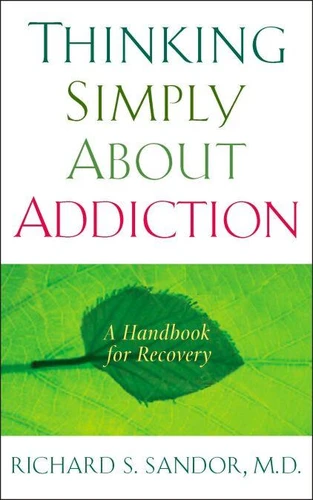Thinking Simply About Addiction. A Handbook for Recovery
Par :Formats :
Disponible dans votre compte client Decitre ou Furet du Nord dès validation de votre commande. Le format ePub protégé est :
- Compatible avec une lecture sur My Vivlio (smartphone, tablette, ordinateur)
- Compatible avec une lecture sur liseuses Vivlio
- Pour les liseuses autres que Vivlio, vous devez utiliser le logiciel Adobe Digital Edition. Non compatible avec la lecture sur les liseuses Kindle, Remarkable et Sony
- Non compatible avec un achat hors France métropolitaine
 , qui est-ce ?
, qui est-ce ?Notre partenaire de plateforme de lecture numérique où vous retrouverez l'ensemble de vos ebooks gratuitement
Pour en savoir plus sur nos ebooks, consultez notre aide en ligne ici
- Nombre de pages208
- FormatePub
- ISBN978-1-101-02226-9
- EAN9781101022269
- Date de parution05/03/2009
- Protection num.Adobe DRM
- Taille182 Ko
- Infos supplémentairesepub
- ÉditeurTarcher
Résumé
A profound yet practical guide to understanding addiction and recovery from an authority on the subject. No social problem today causes greater confusion than addiction. Whatever form it takes - alcohol, heroin, cocaine, nicotine, etc. - it tears apart homes and relationships, destroys careers and futures, and leaves loved ones asking: Why couldn't he stop once and for all? Or "get better"? Or control himself? Despite everything that's been said and written, many people remain deeply confounded about these problems.
The addiction-treatment field itself is in a state of civil war because there is no consensus on what addiction is, much less what to do about it. Based on years of hard-won experience by a preeminent specialist in addictive behavior, Thinking Simply About Addiction explains the core truth of addiction: It is not a neurosis, a physical malady, a behavioral choice, or, in the narrowest sense, a moral failure.
It is an automatism - an involuntary, non-stoppable behavior that once triggered leaves the addict powerless. It is a human problem and a part of human nature. As such, it is something that we all experience. In four to-the-point chapters, Thinking Simply About Addiction rises above the noise level and provides real-world help and new ways of thinking for addicts and those who care for them. Its insights are so profoundly clear and sensible that many readers will be able to say: Finally, someone gets it.
The addiction-treatment field itself is in a state of civil war because there is no consensus on what addiction is, much less what to do about it. Based on years of hard-won experience by a preeminent specialist in addictive behavior, Thinking Simply About Addiction explains the core truth of addiction: It is not a neurosis, a physical malady, a behavioral choice, or, in the narrowest sense, a moral failure.
It is an automatism - an involuntary, non-stoppable behavior that once triggered leaves the addict powerless. It is a human problem and a part of human nature. As such, it is something that we all experience. In four to-the-point chapters, Thinking Simply About Addiction rises above the noise level and provides real-world help and new ways of thinking for addicts and those who care for them. Its insights are so profoundly clear and sensible that many readers will be able to say: Finally, someone gets it.
A profound yet practical guide to understanding addiction and recovery from an authority on the subject. No social problem today causes greater confusion than addiction. Whatever form it takes - alcohol, heroin, cocaine, nicotine, etc. - it tears apart homes and relationships, destroys careers and futures, and leaves loved ones asking: Why couldn't he stop once and for all? Or "get better"? Or control himself? Despite everything that's been said and written, many people remain deeply confounded about these problems.
The addiction-treatment field itself is in a state of civil war because there is no consensus on what addiction is, much less what to do about it. Based on years of hard-won experience by a preeminent specialist in addictive behavior, Thinking Simply About Addiction explains the core truth of addiction: It is not a neurosis, a physical malady, a behavioral choice, or, in the narrowest sense, a moral failure.
It is an automatism - an involuntary, non-stoppable behavior that once triggered leaves the addict powerless. It is a human problem and a part of human nature. As such, it is something that we all experience. In four to-the-point chapters, Thinking Simply About Addiction rises above the noise level and provides real-world help and new ways of thinking for addicts and those who care for them. Its insights are so profoundly clear and sensible that many readers will be able to say: Finally, someone gets it.
The addiction-treatment field itself is in a state of civil war because there is no consensus on what addiction is, much less what to do about it. Based on years of hard-won experience by a preeminent specialist in addictive behavior, Thinking Simply About Addiction explains the core truth of addiction: It is not a neurosis, a physical malady, a behavioral choice, or, in the narrowest sense, a moral failure.
It is an automatism - an involuntary, non-stoppable behavior that once triggered leaves the addict powerless. It is a human problem and a part of human nature. As such, it is something that we all experience. In four to-the-point chapters, Thinking Simply About Addiction rises above the noise level and provides real-world help and new ways of thinking for addicts and those who care for them. Its insights are so profoundly clear and sensible that many readers will be able to say: Finally, someone gets it.



